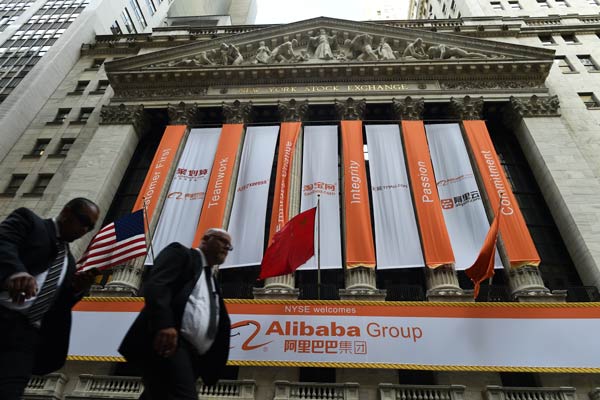HK's capital-raising role under increasing threat
By XIE YU (China Daily) Updated: 2014-12-18 07:48
 |
|
Chinese e-commerce giant Alibaba Group Holding Ltd made its historic trading debut on the New York Stock Exchange on Sept 19. The overall strength of the US market and access to capital are all likely to encourage more Chinese cross-border IPOs on US exchanges in 2015. [Photo/Agencies] |
Changes in rules on mainland, US advantages erode city's position
Deregulation on the mainland poses a rising threat to Hong Kong's role as a source of capital for Chinese enterprises next year, according to stock analysts and investment bankers.
Proposed changes in listing rules will greatly enhance the competitiveness of the exchanges in Shanghai and Shenzhen against Hong Kong. But the biggest challenge to Hong Kong's position as a major market for the lucrative Chinese initial public offering business is likely to come from New York.
"The US attracts more cross-border IPOs than any other market and its stock exchanges lead the world in terms of deals and capital raised," said Jacky Lo, a partner in the capital markets division of international accounting firm and consultancy Ernst & Young LLP.
"In addition to the strong IPO valuations of foreign listings, the growing familiarity with US accounting regulations, the overall strength of the US market and access to capital are all likely to encourage more Chinese cross-border IPOs on US exchanges in 2015," Lo said.
In a report released on Wednesday in Hong Kong, the firm noted that 15 Chinese enterprises, mostly in the Internet technology sector, raised an aggregate $29.1 billion in 2014, up more than 3,000 percent from last year.
That was more than the total of $28.8 billion raised in the Hong Kong IPO market this year. And mainland enterprises accounted for 86 percent of the total.
Some analysts contend that if Hong Kong had agreed to change its rules to accommodate the listing of Alibaba Group Holding Ltd, the biggest IPO ever, it would have trumped New York in the 2014 global IPO market ranking.
Alibaba's corporate structure, and the relative power of outside shareholders compared with the management, led to Hong Kong rejecting the listing.
But in standing firm against Alibaba, "Hong Kong regulators showed that they place investor protection as a top priority", a report by KPMG LLP said. "On the other hand, it is worth exploring the possibility of flexing the rules to accommodate the fast-changing environment."
E&Y forecast that the number of IPO transactions on Hong Kong's stock exchange in 2015 will be around 120, raising an estimated total of about HK$200 billion ($25.8 billion).
The Hong Kong capital market is expected to face several major negative factors, including the projected economic slowdown on the mainland, larger capital outflows back to the US, and nagging economic problems in the eurozone and Japan, the report said.
Meanwhile, listing reforms on the mainland could streamline the IPO application process and make Hong Kong less attractive.
The problem for Hong Kong is compounded by a poor market performance relative to the bull run on the mainland stock exchanges.
Returns this year through Dec 4 averaged 133 percent for mainland listings, dwarfing the 4 percent yield in Hong Kong, according to E&Y.
But some analysts believe that Hong Kong's strengths are lasting.
"Hong Kong is still a top choice with its efficient system and low-cost financing channels," said Ringo Choi, who specializes in IPOs at E&Y.
"Policy from the mainland government is hard to predict in terms of IPO approval ... for healthy companies that do not prioritize short-term benefits, Hong Kong is good destination."
- Cash crunch fans expectation on RRR cut
- US extends antidumping duties on China's thermal paper
- Modern food van with ancient look in Shanghai
- China home prices continue to cool in November
- Asia's top 3 billionaires all Chinese
- Old investment remedy the treatment for China's "new normal"
- China's solar sector opposes US anti-dumping ruling
- BMW to recall 846 cars in China
















